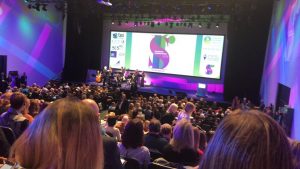I sit and write this blog after one of the most thought provoking discussions so far in my university journey. One in which we were discussing theories such as the Montessori, Owen and Frobel perspectives on education. Each being primarily child-centre focused and broadening on aspects of children thriving on their own initiative and creativity.

It has been a week since I attended the Scottish Learning Festival in Glasgow. Amongst many very interesting seminars, I was particularly hooked on an inspiring talk on the “Play in Primary One” perspective of Canal View Primary School in Edinburgh, a school which has benefited from Pupil Equity Funding (PEF) due to increasing poverty surrounding the area and high levels in the SIMD indicators for deprivation.
After finding that a change had to be made into the dynamics of their early years classroom, Canal View completely replenished their existing timetable. It enabled them to create a more active learning environment in which the children, like the views of the practitoners in the opening paragraph expressed, could thrive in and build on their own learning. This was enforced by employing extra members of staff through PEF, including a child psychologist, an early years practitioner and a speech therapist.
What they then found, was that their stats on both numeracy and literacy rose significantly within just a year of their new practice. What they found to be a key aspect of this change was more collaboratively encouraging continuous dialogue within the classroom, having planned and purposeful play (waiting til children were READY for phonics, reading and writing) and stripping certain things back to basics, for example, teaching children skills such as listening.

Standardised scores from Canal View after one year of new programme.

Vocabulary pie charts over one year at Canal View.
They did find some difficulties within this however. It took a lot of time and not just within the planning of this, but to get the parents on board with the new ideas. They expressed to sustain the high levels of achievement, they would need two new members of staff for the following year. This they could do with PEF.
Now what striked me today, during the lecture on these practitioners was, are we really getting it right for every child? Yes, you could argue that Canal View is a prime example of a wonderful success story. But could it have been achieved without the increasing staff numbers and the funding available? Why is it not compulsory for us as teachers to have access to these professionals and other specialists in order for our children to have the best learning experience?
Robert Owens in his theory stressed that creative subjects are key to improving health, education, well being and rights of the working class. He used those subjects in his system to relieve stress and when minds became fatigued, he would engage in these subjects with pupils to expose them to physical exercise and music.
When I came to Dundee from Orkney I was surprised that there were next to no specialist teachers in the classroom. From somebody who had achieved great things through music, art, PE and drama at school, I couldn’t understand how a child would thrive in any environment without these subjects. I am thankful to have an interest in these subjects and feel (with practice) I could expose my students to these key subjects in good detail. The same cannot be said for all teachers however. Having specialist creative arts and technology teachers provides our children with enriching experiences that can benefit them in not just the classroom but in their lifelong learning.
In a recent survey, Education Scotland (2013) said that the general consensus of creative skills amongst teachers were as follows:
” Although most staff are familiar with the interrelated skills within the revised Bloom’s Taxonomy, there is general agreement that understanding of the creative process and associated
creativity skills as distinct concepts needs to be enhanced across education sectors,
so that their particular characteristics can be developed for the benefit of children
and young people.”
What I feel strongly about is that specialist teachers are crucial to a child’s development. It was shown in Canal View to make an incredible difference to not just the children’s creative skills, but their all round skill levels, including numeracy and literacy. I feel that to remove this from schools is a major injustice to our children in Scotland and it will be interesting to see how this changes in the future.
Standing up, speaking out and supporting our children in their journey through school – if it can make a difference to some schools, we must ensure this is happening in the rest of Scotland.

Reference:
Education Scotland (2013), Creativity Across Learning 3-18, Livingston: Education Scotland






